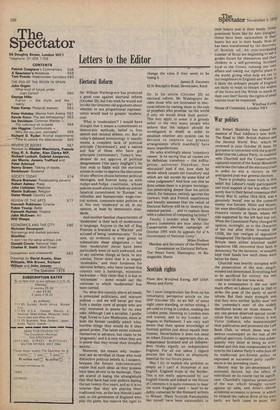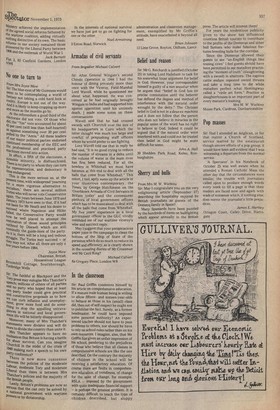War politics
Sir: Robert Skidelsky has missed the essence of Paul Addison's new book, The Road to 1945: British Politics and the Second World War, which he reviewed in your October 25 issue. Its gravamen is concerned with the popular belief that the Labour Party, in coalition with Churchill and the Conservatives, captured control of the Social Ministries and broke the rules of the electoral truce in order to win a victory in the anticipated post-war general election. There is probably some truth in that belief; but Labour's ready participation and loyal support of the war effort was surely due to their broad consensus that World War II, unlike 1914-1918, was a genuinely 'moral' war as the common enemy was fascism. Hitler and Mussolini were identifiable as the architects of Franco's victory in Spain, where the side supported by the left had lost out. When the Communist Party changed its opinion, overnight, as to the character of the war after Hitler invaded the USSR, the last vestiges of opposition disappeared. The fascist sympathisers in Britain were either interned under regulation 18B, recovered their faith itt democracy 'for the duration,' or sensiblY kept their heads low until times were better for them.
Churchill was heavily occupied with the prosecution of the war, singleminded and determined. Everything had to be sacrificed for victory; the rest could wait till the war was won.
As a consequence it did not take much effort on Labour's part in 1945 to strike the pose of the party of social reform. But their main strength was that they were neither 'guilty men' not the 'yesterday's men' of the widely distributed books on those themes. If any one person deserved special recognition from the Labour victors it was Victor Gollancz, who masterminded their publication and promoted the Left Book Club, to which there was no serious counterpart on the rest of the political spectrum. Gollancz was subsequently very bitter at being so overlooked and this was compounded in his eyes by the Labour Party's volte-face on its traditional pro-Zionist policy as expressed at successive party conferences in the preceding years. History may be pre-determined by economic factors, but the effect of individuals on its course can be significant. Churchill's vigorous prosecution of the war, which brought victory against all odds, and Atlee's almost accidental accession to power, in which he vitiated the radical drive of his own party. are both cases in' point. His Ministry achieved the implementation of the agreed social reforms fathered by the wartime coalition, adding virtually nothing distinctive of its own. The basic reforms to our society remained those Pioneered by the Liberal Party between 1906 and the outbreak of World War I.
Jack Barnett Flat 2, 63 Canfield Gardens, London NW6

































 Previous page
Previous page